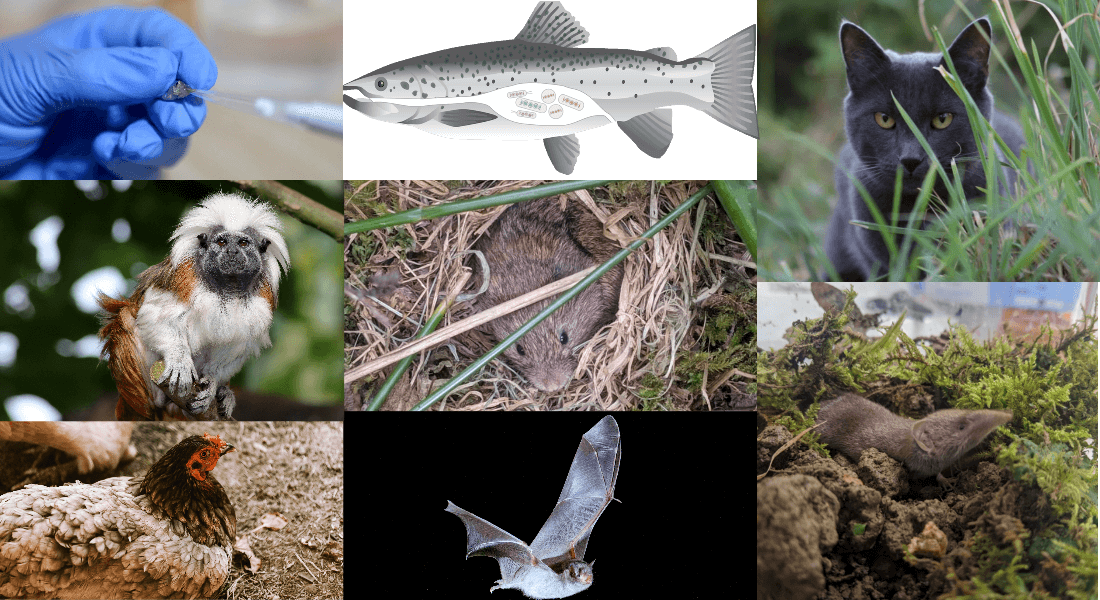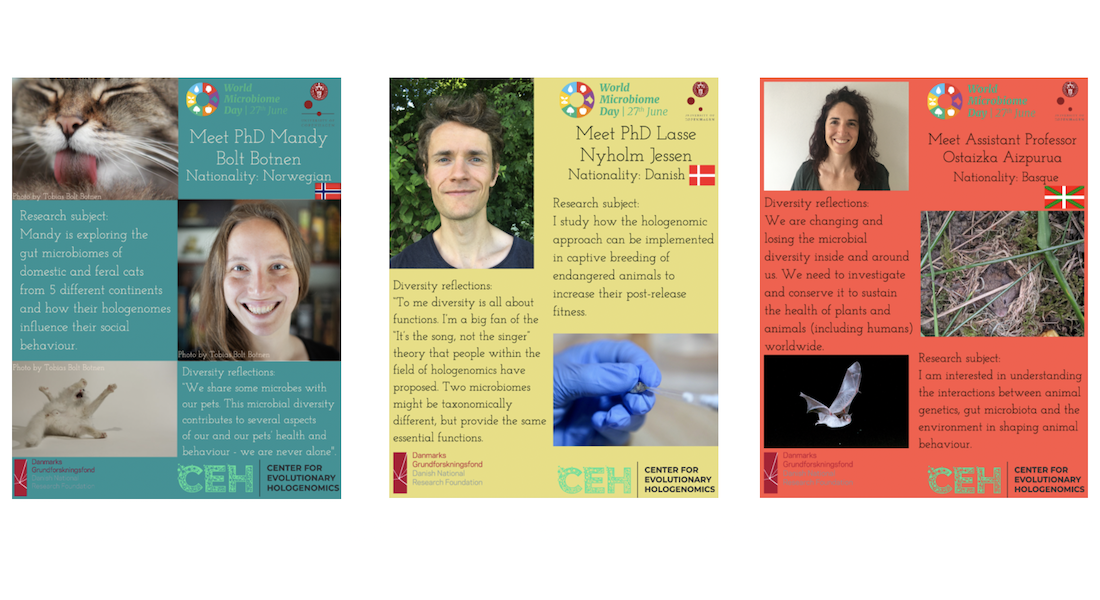Diversity reflections celebrating World Microbiome day
On the 27th of June we join fellow researchers from around the world to celebrate World Microbiome Day - an online event open to everyone. This year's special theme is “Diversity” - celebrating diversity of microbes, microbiome habitats, diets to feed and fuel microbiomes and the diversity among microbiome researchers and their study subjects.

Microbiome research is increasingly getting more attention for its vital role in our everyday lives which is celebrated around the world on World Microbiome Day (attend the events online). Two large research projects at University of Copenhagen: The EU funded Innovation Action Holofood as well as the new basic research center Center for Evolutionary Hologenomics are at the forefront of the new exciting research area called Holo-omics.
Why celebrate microbiomes?
Microorganisms (bacteria, fungi, viruses, archaea, etc) can be found everywhere in and on plants, animals, water, soil, food as well as humans. Within and on each of these hosts, microorganisms live together in communities called microbiomes. Microbiomes have an effect on (amongst others) human and animal health; therefore, scientists are exploring how these communities of organisms coexist with each other, with us and our environment.
The Holo-omic approach
Until recently, research in microbiomes has had a focus on the human gut microbiome as an active contributor to our health. However, there is little understanding of the interaction between food, the genome, and the microbiome in the gut. This holo-omic approach is changing our view/approach and we are now investigating the world around and within us by studying animals and their respective microbiome as one unit of evolution rather than separate entities. If we can decode and understand biomolecular and physical processes, we can improve plant, animal, and human health and create a more sustainable future. This is the idea behind both the research project Holofood and the Center for Evolutionary Hologenomics.
Diversity reflections within the field of holo-omics
The diverse world of microbes deserves recognition due to its effect on human, animal and environmental health. Therefore, we celebrate World Microbiome Day by focusing on diversity.
We have asked some of the aspiring researchers at Center for Evolutionary Hologenomics and the Holofood EU project what diversity means to them within this exciting new field of holo-omics and microbiome research. Each day during the week leading up to World Microbiome Day we will introduce our aspiring researchers, their research subject as well as their views on diversity on our social media channels.

PhD Lasse Nyholm from Denmark: “To me diversity is all about functions. I’m a big fan of the “It’s the song, not the singer” theory that people within the field of hologenomics have proposed. Two microbiomes might be taxonomically different, but provide the same essential functions.”
Postdoc Aoife Leonard from Ireland: “The interaction between animals and gut microorganisms associated is a major driver of diversity, which is especially important in a changing world.”
Assistant Professor Ostaizka Aizpurua from the Basque country: “We are changing and losing the microbial diversity inside and around us. We need to investigate and conserve it to sustain the health of plants and animals (including humans) worldwide.”
PhD Adam Koziol from Australia: “Diversity to me in this sense is the accumulation of all possible traits/combinations that may result in different assortments and phenotypes to their hosts. Diversity to me is an endless sea of possibilities.”
Postdoc Laurène Alicia Lecaudey from France “The diversity of microbes and their profound impact on diverse aspects of life. But also to understand this, every scientist needs to endorse a diversity of tasks to fulfill a project: study design, planning, sampling, lab work, bioinformatics, interpretation, writing, publishing and science communication.”
PhD Linett Rasmussen from USA: “Microbial diversity can alter our health and behaviour, which makes me think that we are never in full control of ourselves. Thus, blame my microbes when I get hangry.”
PhD Jacob Agerbo Rasmussen from Denmark: “To me diversity is a matter of possibilities. In relation to microbiomes, high diversity accumulates a variety of different microbes, which is a gain of possible adaptations to a given situation."
PhD Mandy Bolt Botnen from Norway: “The hologenome holds many exciting discoveries, as reference databases are expanded and sequencing becomes more accessible allowing us to further explore the diversities in and on our pets. One of my favourite aspects of learning about microbes and hologenomics is that any individual is never alone.”
Read more and follow the new groundbreaking research from Center for Evolutionary Hologenomics and the Holofood EU project as we explore this new exciting basic research area.
Twitter: www.twitter.com/evohologen and www.twitter.com/holofood_EU
LinkedIn: www.linkedin.com/company/center-for-evolutionary-hologenomics/
Instagram: https://www.instagram.com/evohologen/
Website: www.ceh.ku.dk and www.holofood.eu
Contact:
Christina Lehmkuhl Noer
Scientific Outreach Specialist
Center for Evolutionary Hologenomics
The GLOBE Institute
Faculty of Health and Medical Sciences
University of Copenhagen
ceh@sund.ku.dk
Anna Fotaki
Project Coordinator
Center for Evolutionary Hologenomics
The GLOBE Institute
Faculty of Health and Medical Sciences
University of Copenhagen
holofood@ku.dk
